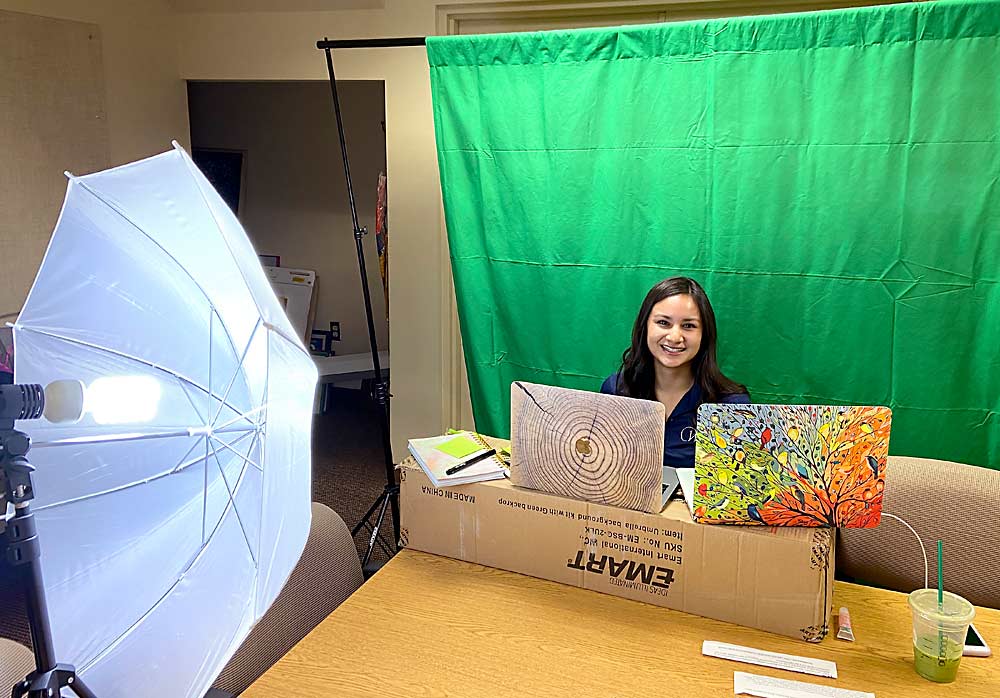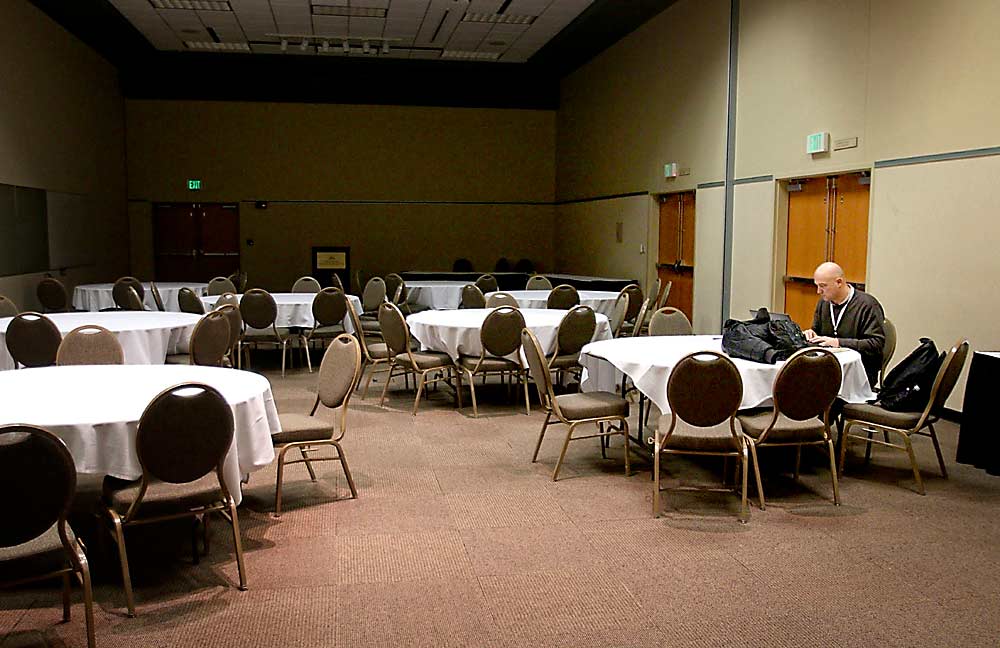
Come fall, Erika Betancourt normally would visit high schools throughout Washington’s fruit region, helping students find and apply for scholarships. The coronavirus has already forced her hand.
Betancourt, the scholarship specialist for the Washington Apple Education Foundation, has been filming herself in 30-second YouTube tutorials for seniors, just in case she can’t help them personally. After all, who knows if schools will open by September?
“We’ve started a replacement process already,” said Jennifer Witherbee, the executive director of the foundation, Washington’s fruit industry scholarship charity.
Across the globe this spring, the pandemic forced organizations to cancel, reschedule or virtualize their gatherings. But the adjustments may continue through the summer, fall and early next year. Groups are making contingency plans in case travel and gathering restrictions continue or a resurgence of infections prompts authorities to reimpose them.
A common pivot is to go digital, so groups such as the International Fruit Tree Association, the Michigan State Horticultural Society and the Washington State Tree Fruit Association are evaluating and pricing virtual meeting platforms. Those groups hold winter meetings and have been watching and learning from organizations that already have made similar changes this spring.
In May, Northwest Cherry Growers held its annual 5-State meeting online with Zoom. Also in May, the U.S. Apple Association already decided to move its annual Apple Crop Outlook and Marketing Conference, normally held in August in Chicago, to a digital format because Illinois’ phased reopening plans would most likely not allow gatherings of 50 or more people by then.
The group is looking at the bright side, figuring that going digital might open the industry discussions to more people than usual. “We know this is disappointing news,” USApple said in a news release announcing the decision. “However, our goal is to use this opportunity to leverage outstanding and engaging content in order to broaden the conference’s reach to a larger, virtual audience. We already have great speakers lined up and have been studying best practices of other organizations that have successfully executed virtual events.”
The International Fruit Tree Association, or IFTA, has its winter meeting and tours scheduled for the Tri-Cities, Washington, in February 2021 — still seven months away. The event typically attracts 300 or more attendees.
“We’re in the very early stages of looking at what Plan B looks like,” said Shane Johnson, president and owner of Ag Association Management, the Kennewick, Washington, company that facilitates IFTA events.
Ag Association Management also organizes the Washington State Grape Society’s annual meeting in November in Grandview. Johnson is on the lookout for virtual tools for that, as well.
IFTA organizers are mostly recruiting speakers based in North America and limiting those who would have to travel internationally.
“All of this is kind of back-burner-type stuff because our end goal is to have this meeting in person if we can,” said Jeff Cleveringa, IFTA’s current vice president.
IFTA has already pivoted due to the coronavirus, canceling its summer tour that was scheduled for this month in the Tri-Cities, and then relocating the February gathering from California to the Tri-Cities, where it already had hotel commitments and planners.
IFTA also plans to tour through the growing regions of Northern Italy in November this year, if it can. As of June 1, Good Fruit Grower’s press deadline, the group had not made a decision about whether to cancel, waiting to hear the fate of Interpoma — one of the world’s largest apple trade shows — included on IFTA’s agenda, Cleveringa said.

The Washington State Tree Fruit Association and the Great Lakes EXPO are scheduled for early December in Kennewick, Washington, and Grand Rapids, Michigan, respectively. Organizers of both intend to hold the conferences in-person if possible and will switch to virtual meetings or some hybrid of the two if needed. For example, some universities are restricting travel more than others, meaning some speakers may end up streaming digitally to a conference room of in-person attendees, said Ben Smith, executive secretary of the Michigan State Horticultural Society, one of the two organizations that host the Great Lakes EXPO.
Organizers have to be nimble, Smith said. If the coronavirus behaves like the flu, infection rates could drop over the summer and surge in December. The Michigan State Horticultural Society typically opens registration in October.
“We need to have that backup … ready to go at the flip of a switch,” Smith said.
Changing plans is more than just a hassle. Big gatherings serve as revenue streams for the organizations. IFTA, the Washington State Tree Fruit Association and the Michigan State Horticultural Society all have healthy reserves for emergencies, they said.
The Produce Marketing Association, or PMA, is one of the largest produce organizations in the world, with 20,000 members, according to its website. The group has many of the same questions. The group’s biggest event is the Fresh Summit Conference and Expo, scheduled for Oct. 15–17 in Dallas, Texas. Speakers include Magic Johnson and Queen Latifah. The group planned to make its decision about Fresh Summit by the end of June.
“While planning these events is quite the undertaking, we know that attending in a variety of capacities is an investment of time and resources for our guests,” said Siobhan May, PMA’s director of communications.
PMA has moved Foodservice Delivered, a conference normally held in Monterey, California, online. The group’s Virtual Town Hall Series, a digital platform for discussions with industry leaders, existed before the pandemic.
Some future industry events have already rescheduled.
The International Society for Horticultural Science orchard systems symposium, originally scheduled for this month in Washington, has been rescheduled for August 2021.
And the Washington Apple Education Foundation rescheduled two of its fundraiser golf tournaments to Aug. 11 in Wenatchee and Sept. 15 in Yakima, but had to simply cancel this month’s annual scholarship luncheon. The luncheon typically attracts 1,000 people to raise scholarship money and applaud recipients. It’s usually one of the state fruit industry’s annual feel-good events.
Organizers debated trying to hold a digital version but didn’t think it would be the same and instead opted to produce a film about the stories of this year’s scholarship recipients and college graduates.
“We believe we will be able to share that scholarship joy with a wider audience,” Witherbee said. •
—by Ross Courtney






Going online with industry events is crucial at this point as the cases of Covid19 are pilling. Online events give not only better accessibility to all stakeholders but also creates wider reach. Thanks for sharing this article.